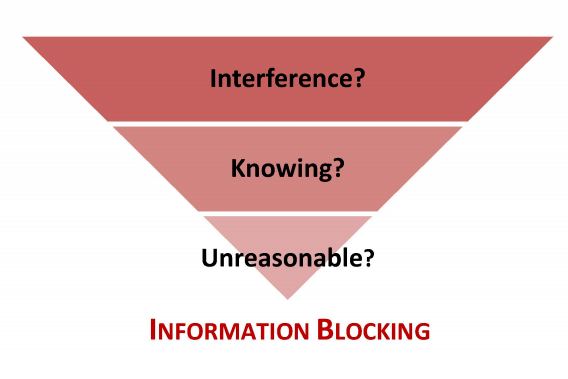
Note: Dr. Mark Crockett is the chief medical officer of Rise Health, a Best Doctors company. The company provides solutions to deliver the right care at the right time to the right patient.

Today’s healthcare headlines state the problem succinctly’: ‘EHR Data Blocking Hobbles HIT’; ‘EHR Data Blocking Still Rampant’ and more. Search ‘EHR data blocking’ on Google and you get 81,000 entries. Data blocking is clearly obstructing progress towards value-based care and is the enemy of collaboration. But the handful of EHR vendors holding up progress towards data sharing won’t be able to resist pressure from the industry – and the industry’s biggest payer, the federal government – for long.
Examples of EHR data blocking include EHR vendors charging a fee to extract data from their EHR any time a provider wants to share data, or the vendor insisting that data can only be shared within their proprietary system. The healthcare industry is not happy about data blocking and wants something done about it. The Office of the National Coordinator for Health Information Technology, fueled by Congressional mandate, has asked the Federal Trade Commission to look into data blocking incidents.
While we await further federal action, the industry is moving forward on using data to transition to value-based care. Our experience with a Colorado primary care initiative shows how essential interoperability of health records is for expanding value-based care and how harmful EHR data blocking is for the entire healthcare system.
The Colorado Primary Care Initiative
We were selected to provide a data sharing tool for 74 primary care practices covering 94,000 patients in Colorado. The tool links data from all participating payers and puts it into a single source web login for providers to see all patient claims in one spot.
Combined with an online portal where providers can access information in easy-to-understand visualizations, providers have the ability to stratify populations across common risk levels. A next step is to push those analytic insights directly into the actual care continuum, bringing valuable data to the clinicians’ fingertips to close care gaps, meet value-based care arrangements and focus on more critical care needs.
The combination of integration, analysis and distribution of analytic insights made available during the care process is a significant advance for providers, payers and the treatment of patients in Colorado. We anticipate duplicating our success in Colorado with other systems across the country.
Data Blocking as a Short Term Strategy
Data blocking is at best a short-term strategy to hold on to market share and meet revenue targets. Working with Colorado providers, we were able to demonstrate the value of seeing their claims data in one place. Had any EHR stepped in to block any of that shared data, I doubt that they – or any other provider for that matter – would want to go back to the days of juggling multiple reports.
But don’t take our word for it. Five years ago, 20 percent of providers had an electronic medical record. Today that figure is 80 percent. As this transition occurred, technologies to make these records “talk” to each other and flow from physician office to hospital and back again were developed. Moore’s Law, which holds that computing power doubles every two years, still holds true. We can share data faster and with more complexity than ever before.
Humana CEO Bruce Broussard offers additional perspective when he compares healthcare’s roadblocks to interoperability to the financial services industry, which was initially reluctant to offer competitors’ products: “Charles Schwab became the first to offer competitors’ products. Today, it would be unheard of not to offer other products.”
Data blocking is the enemy of collaboration, a prerequisite to delivering personalized care experiences that improve quality reduce costs and enhance satisfaction. The $3 trillion healthcare industry isn’t going to let a few bad actors intentionally slow the inevitable progress being made in health IT and health information exchange. At Rise Health, we’re moving full speed ahead to help transform health and health care.
